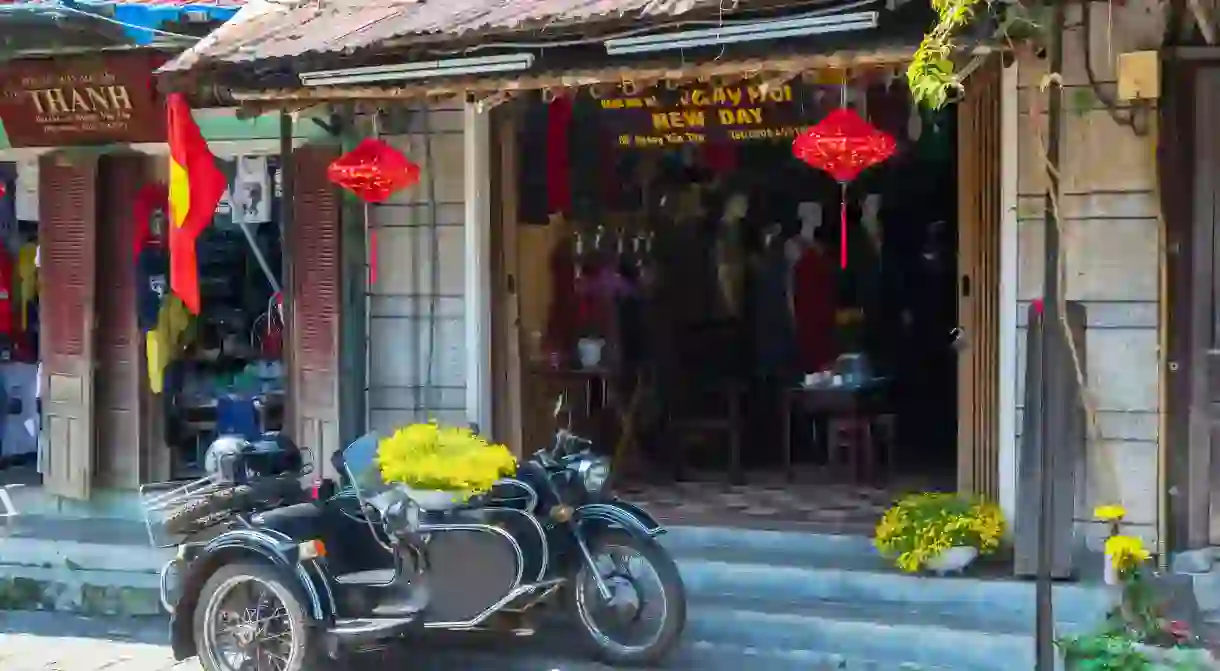How Vintage Stores Are Shaping Hanoi's Fashion Future

The country of Vietnam is quickly changing, and the capital Hanoi is no exception, with a fast-growing economy and new, towering skyscrapers. A subtler difference can be seen through the country’s growing concern with sustainability. Genevieve Nickel meets three young Vietnamese thrift shop owners in Hanoi who are taking on fast fashion.
Buying second-hand clothes is already a very common trend in Vietnam. Popular Hanoi vintage shops like Maniac Vintage Store, Chăn Con Công and Sleek enjoy hundreds of followers on their social media channels, and entire markets are dedicated to second-hand fashion clothes coming from North America, Europe, Korea and Japan. New thrift shop owners in Hanoi are starting to market purchasing from their shops as a sustainable lifestyle choice now that Vietnamese shoppers are becoming more concerned with the environment.
Owners Trần Hà and Minh Trí of Sleek thrift shop in the Tay Ho area brand themselves as old school. In fact, most of their clothes are old, dating from the ’80s and ’90s, and having been donated by charities from North America and Europe to Cambodia. Their suppliers in Phnôm Pênh sort through donated clothes, selecting items that fit the retro style of their shop.
“[Cambodian] charities only need so many clothes, the profit they make from selling clothes goes towards buying other necessities,” says Trần.
When opening their store in 2019, the owners were inspired by longstanding Hanoi thrift shops like Nasty, which has been open in Hanoi since 2011. Sleek has colourful bomber jackets, large T-shirts with cheeky sayings, baggy jeans and curiously detailed leather belts. “I love everything street style,” explains Trần. Trần tells Culture Trip that Vietnamese hipsters and patrons of their store aren’t only thrifting to find cool clothes and score American brands, “they come here because they want to make a sustainable choice.”

Urban Circular Space (USC), the newest addition to Hanoi’s thrift scene that opened mid-January, right before the Lunar New Year, is hoping to kill fast fashion by selling second-hand clothes and recycling fabric that’s heading for the bin. The hideaway shop in an apartment block in Đống Đa already has 5,800 followers on Facebook. A quick look at the shop and you’ll understand its popularity. Hundreds of fashionable frocks all arranged by colour hang on the racks sold at a bargain price of 150,000 to 200,000 Vietnamese Dong (£5.10 to £6.80).
Ha Phung, owner of USC, is frustrated with fast fashion and wants to combat clothes waste at the micro-level with guerilla-like methods. Items that she can’t sell because they are too outdated get recycled into new items. Phung strikes deals with artisans she finds on Facebook to turn these unwanted clothes into denim bags, textile pencil cases or notebook covers. Both parties win because Phung is able to get rid of unwanted clothes while the artisan gains free materials and most of the profit from any sales made at USC.
Phung tells Culture Trip that she hopes that through trial and error and the standardisation of this upcycling system, she will be able to close the loop of clothing sustainability in her shop. Eventually though, she’d like to see consigning and recycling clothes go mainstream in Vietnam. “I’d like to see my thrift shop become a model in Vietnam that is as common as a convenience store,” says Phung.
Although thrift shop owners like Phung and Trần see a lot of potential for second-hand shops to thrive in Hanoi, Vietnam remains one of the top five textile and garment exporters in Asia, keeping the dream of a zero-clothes-waste future at bay. Just take a look at the Old Quarter’s night market or Hanoi’s main shopping streets like Lê Duẩn. You’ll see hundreds of Made in Vietnam shops and other retail outlets selling fashion cheaply.
Second-hand shopping might be popular in Vietnam, but so is fast fashion. Phung wanted to refuse the large quantities of clothes she was receiving from people doing their annual house cleaning before the Lunar New Year. “Those people are just going to buy new clothes later,” which completely defeats the purpose and mission of USC she explains.
But USC clientele gives Phung hope that mentalities are changing. She recalls how after a brief conversation, a customer offered to lend her a pair of hiking boots for an upcoming trek so that she wouldn’t need to go out and buy a new pair. Bùi Điệp, environmentalist and chief operating officer of Keep Hanoi Clean, a program that organises monthly gatherings to clean up Hanoi’s most polluted areas, receives much of her organisation’s funds through profits earned at its Green Gem thrift shop.
Volunteers sort through all of Green Gem’s donated clothes, which can take hours. “It’s crazy. We don’t even announce that we accept donations but we still have an entire floor of just clothes,” Điệp says. Over the past three years since Keep Hanoi Clean started, Điệp has noticed a marked increase in the number of Vietnamese youth getting involved in clean ups along with strong community support from local businesses regularly donating prizes. The younger generation is starting to take environmental issues seriously but she worries they aren’t changing their habits fast enough. “We ask our customers to only buy from us when they really need to,” she adds.
A sustainable fashion future in Hanoi is slowly developing, but as Phung from USC points out, “people simply need to buy less.” It’s still too soon to tell if thrifting will one day become the principal means to purchase clothes in Hanoi. Young Vietnamese shop owners like Phung with her upcycling program, Điệp with her environmental awareness initiative and Trần and Minh that lengthen the lifespan of clothing items, are all working towards making Vietnam a little bit more sustainable every day.













